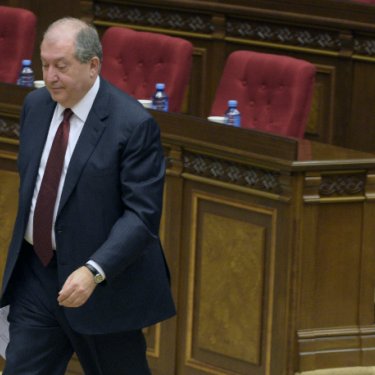Mounting concern about press freedom in Armenia

As Armen Sarkissian, the first Armenian president to elected by parliament, prepares to take office on 9 April, Reporters Without Borders (RSF) points out that halting the decline in media freedom will be a major task facing Armenia’s government.
“We are disturbed by the downward trend in respect for press freedom in Armenia and we urge parliament to reconsider recent legislative initiatives reducing the right of access to information and obstructing journalists’ work,” said Johann Bihr, the head of RSF’s Eastern Europe and Central Asia desk. “The authorities must also conduct full and impartial investigations into acts of violence against journalists and end impunity for such acts.”
Right to information threatened
RSF is concerned about a series of legislative initiatives reducing journalists’ access to information in the public interest, the latest of which keep reporters away from the places where the authorities take decisions.
Under legislative amendments passed by parliament on 23 March, without prior discussion with the journalistic community, government ministers will no longer be able to give interviews without the prime minister’s permission, and reporters will not normally be allowed to attend government meetings, including cabinet meetings, which will be held behind closed doors.
A local government law approved the same day included a surprise, last-minute amendment that deprives journalists of access to the city hall in the capital, Yerevan. They will be restricted to a separate press centre and will not be able to attend municipal council meetings without the mayor’s prior authorization.
The amendment was added to the law at its second reading, and its hasty adoption is attributed to an incident at a municipal council meeting in February, when reporters were able to provide live TV coverage of municipal officials and ruling party members using violence against an opposition representative.
In 2017, media and civil society representatives campaigned against a law proposed by the justice ministry restricting access to state-held information. Its provisions were much less liberal than those in place for the past 14 years. In a bid to defuse tension, the bill’s adoption was postponed for six months in December, but local NGOs are still calling for it to be scrapped or for a proper process of consultation.
The lack of consultation is a recurring problem. Journalists did not learn about major amendments to the law on protection of personal data until two months after their adoption in early 2017. The amendments impose drastic curbs on the media’s ability to gather and publish personal information, forcing them to obtain the consent of the persons concerned, regardless of their status.
By eliminating the exemption that journalists previously enjoyed, the law now contradicts Armenia’s media law, which allows the publication of information about a person’s family and private life if a public interest is served. Investigative reporting is now endangered because public figures could sue journalists for revealing personal information even if the journalists were investigating corruption, for example.
Rising violence, continuing impunity
The number of attacks on media personnel has increased in recent years and at least 17 journalists were the victims of violence in 2017.
The 2017 parliamentary election campaign was the most fraught period. Shoghik Galstyan and Hayk Petrosyan of the news website Araratnews.am and Sisak Gabrielyan of the Radio Free Europe/Radio Liberty Armenian service were attacked near the headquarters of one of the candidates in Yerevan on election day itself.
Three other journalists were previously the victims of violence during the election campaign, while several journalists were threatened and prevented from covering the voting.
Surge in defamation suits
Last year also saw a big surge in the number of legal actions against journalists and media outlets. A total of 60 lawsuits were filed in 2017, more than three times the 2016 total of 17, and more than at any time since defamation was decriminalized in 2010.
No fewer than 30 complaints were brought in March 2017 alone against Daniel Ioannisyan, the founder of the fact-checking website Sut.am and an NGO called the Union of Informed Citizens. None of the cases prospered in court.
Armenia is ranked 79th out of 180 countries in RSF's 2017 World Press Freedom Index, five places lower than in the 2016 Index.



